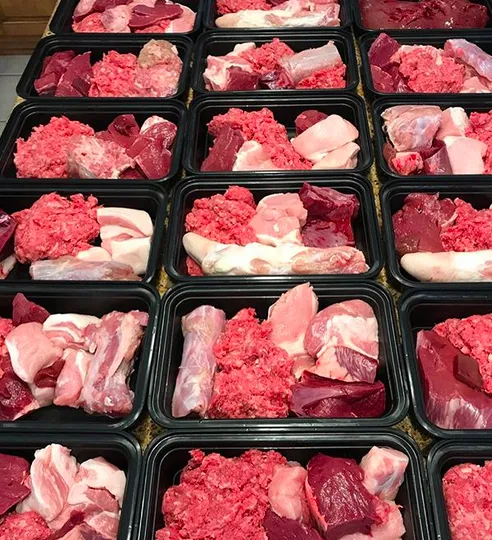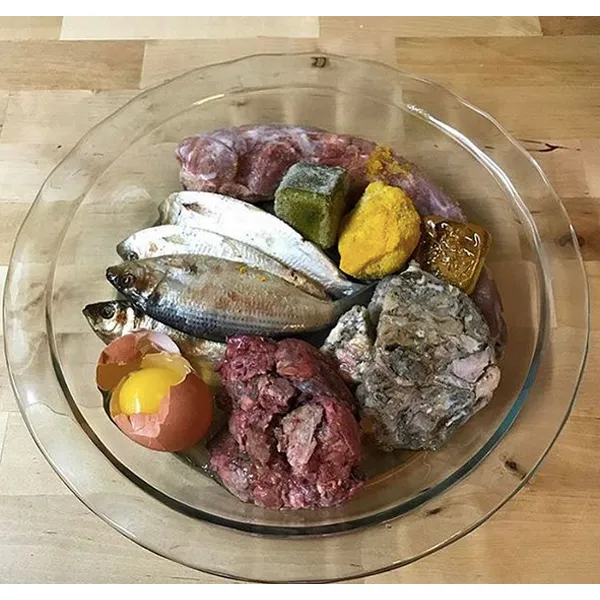Transitioning your French Bulldog to a raw food diet can seem daunting, but understanding the basics of “What Raw Meat Can French Bulldogs Eat” is the first step towards a potentially healthier lifestyle for your canine companion. This guide delves into the world of raw feeding, offering insights and practical advice for Frenchie owners.
The concept of feeding dogs a raw diet, often referred to as the BARF (Biologically Appropriate Raw Food) diet, is rooted in the belief that it mimics the ancestral eating habits of canines. This approach involves feeding uncooked muscle meat, organs, bones, and sometimes small amounts of fruits and vegetables. While proponents suggest numerous health benefits, it’s crucial to approach raw feeding with knowledge and caution. Consulting with your veterinarian, breeder, or a certified canine nutritionist is always recommended before making significant dietary changes for your French Bulldog.
Understanding the BARF Diet for French Bulldogs
The BARF diet, an acronym for Bones and Raw Food or Biologically Appropriate Raw Food, consists of uncooked ingredients that are believed to be more aligned with a dog’s natural dietary needs. This includes:
- Muscle Meat: The primary component of a raw diet, providing essential protein and nutrients.
- Organs: Organ meats, such as liver and heart, are powerhouses of vitamins and minerals.
- Edible Bones: Raw, meaty bones are a good source of calcium and phosphorus and can also help with dental hygiene.
- Fruits and Vegetables: While dogs are primarily carnivores, small amounts of certain fruits and vegetables can offer additional vitamins, minerals, and fiber.
The rationale behind raw feeding is that domesticated dogs have evolved from carnivores that consumed prey whole. Advocates believe that the highly processed nature of commercial kibble can be detrimental to a dog’s long-term health. However, it’s important to note that the FDA and many veterinary organizations maintain a cautious stance on raw diets due to potential risks such as bacterial contamination and nutritional imbalances.
 A French Bulldog enjoying a raw food meal
A French Bulldog enjoying a raw food meal
Potential Benefits of Raw Feeding for French Bulldogs
While the debate surrounding raw feeding continues, many owners report observing positive changes in their French Bulldogs when transitioning to this diet. These potential benefits may include:
- Improved Skin and Coat Health: A shinier, softer coat and reduced skin issues, potentially due to the elimination of allergens found in some commercial foods.
- Enhanced Dental Hygiene: Chewing on raw, meaty bones can help clean teeth naturally, leading to fresher breath.
- Increased Energy Levels: A nutrient-dense diet can contribute to a more energetic and active dog.
- Digestive Health: Many owners report smaller, firmer stools, indicating better nutrient absorption and digestion.
- Reduced Allergies and Inflammation: For some dogs, a raw diet may help alleviate symptoms of allergies and reduce inflammation, which can be particularly beneficial for brachycephalic breeds like French Bulldogs, potentially reducing issues like tear staining and gas.
It’s crucial to remember that these benefits are anecdotal for many, and individual results can vary significantly. Consulting with a professional is key to understanding your specific dog’s needs.
Getting Started with Raw Feeding for Your Frenchie
Introducing a raw diet should be done gradually to allow your French Bulldog’s digestive system to adjust. Instead of an abrupt switch, consider incorporating fresh ingredients into their current diet.
- Gradual Introduction: Begin by adding small amounts of new raw ingredients to your dog’s kibble. For example, you could mix in a raw egg or a small amount of organic coconut oil. Remember to slightly reduce their kibble portion to avoid overfeeding.
- Consider Allergies: If your French Bulldog has known allergies, opt for less common protein sources like quail or duck eggs.
- Introduce Slowly: Introduce new raw foods incrementally over several days or weeks. Avoid making a complete switch overnight.
For those looking for a comprehensive resource, there are many specialized guides and recipes available that can help you create balanced raw meals. You can explore resources that provide what type of food can dogs eat to gain a broader understanding of canine nutrition.
What Specific Raw Meats Can French Bulldogs Eat?
When it comes to selecting raw meat for your French Bulldog, a variety of options can contribute to a balanced diet. The key is to offer a diverse range of proteins to ensure they receive a full spectrum of nutrients.
Safe and Beneficial Raw Meat Options:
- Poultry: Chicken, turkey, and duck are excellent sources of lean protein. This includes muscle meat, hearts, and gizzards. Chicken and turkey necks provide calcium and are great for dental health.
- Red Meats: Beef, lamb, and pork are rich in iron and other essential minerals. Lean cuts are generally preferred. Beef and lamb hearts are highly nutritious organ meats.
- Fish: Small, whole fish like sardines and mackerel are packed with Omega-3 fatty acids, which are crucial for skin, coat, and overall health. Ensure fish is wild-caught and avoid larger predatory fish that may contain higher levels of mercury. Always feed fish raw, as cooking can deplete nutrients and create bone splintering hazards.
- Game Meats: Rabbit and venison can be good options, especially for dogs with sensitivities to more common proteins.
Organ Meats:
Organs are vital for a balanced raw diet, providing essential vitamins and minerals. Key organs to include are:
- Liver: An excellent source of Vitamin A, iron, and other crucial nutrients.
- Heart: Rich in taurine, essential for heart health, and a good source of protein.
- Kidney: Provides vitamins and minerals, including B vitamins.
- Gizzards: Offer protein and can contribute to dental health.
 A raw food meal for a French Bulldog with various meats and supplements
A raw food meal for a French Bulldog with various meats and supplements
Bones:
Raw, meaty bones are a natural part of a canine diet. They provide calcium and phosphorus and can help keep teeth clean. Crucially, only feed raw bones. Cooked bones can splinter and cause serious internal injuries. Examples include turkey necks, chicken wings, and lamb ribs. Always supervise your dog when they are consuming bones.
Incorporating Fruits, Vegetables, and Other Nutrients
While meat forms the base of a raw diet, certain fruits and vegetables can supplement the nutritional profile.
- Vegetables: Leafy greens like spinach and kale, along with carrots, broccoli, and bell peppers, can provide fiber, vitamins, and antioxidants. It’s often best to lightly steam or puree these for easier digestion.
- Fruits: Berries, such as blueberries and raspberries, are rich in antioxidants. Apples (seeds removed) and bananas can also be offered in moderation.
- Eggs: Raw eggs, including the shell (unbleached), are a fantastic source of protein, vitamins, and calcium. Quail eggs are particularly nutrient-dense.
- Supplements: To ensure a complete and balanced diet, consider adding supplements like fish oil for Omega-3s, probiotics for gut health, or specialized blends recommended by a nutritionist. Ingredients like turmeric paste are also beneficial for their anti-inflammatory properties. You can learn more about what food can french bulldogs eat to expand your knowledge.
How Much Raw Food Should You Feed Your French Bulldog?
Determining the correct portion size is critical for maintaining a healthy weight and ensuring adequate nutrition. A common starting point is to feed approximately 2-3% of your dog’s ideal adult body weight per day. For a typical 25 lb French Bulldog, this might be around 0.5 to 0.75 lbs of raw food per day.
However, this is a general guideline. Factors such as age, activity level, metabolism, and health conditions will influence the exact amount. It is highly recommended to work with a canine nutritionist to establish a precise feeding plan tailored to your individual French Bulldog. They can help you calculate the right balance of protein, fat, carbohydrates, vitamins, and minerals. Understanding what food is safe for a dog to eat is paramount.
What Raw Meats Should You Avoid Feeding French Bulldogs?
While the raw diet offers many possibilities, there are certain meats and food items that should be strictly avoided to protect your French Bulldog’s health.
- Cooked Bones: As mentioned earlier, never feed cooked bones. They become brittle and can splinter, leading to choking hazards or internal damage.
- Certain Fruits and Vegetables: While many are beneficial, some, like avocados (persin), onions, garlic, grapes, and raisins, are toxic to dogs.
- Processed Meats: Deli meats, sausages, and other processed meats often contain high levels of salt, preservatives, and other additives that are unhealthy for dogs.
- Fatty Trimmings or Spoiled Meat: While fat is a source of energy, excessive amounts of fatty trimmings can lead to pancreatitis. Always ensure the meat is fresh and free from spoilage. You can find more information on what meat should you not feed dogs.
Essential Considerations and Precautions
Embarking on a raw feeding journey requires diligence and a commitment to safety and nutritional balance.
- Bacterial Contamination: Raw meat can harbor bacteria like Salmonella and E. coli. Practice strict hygiene when handling and preparing raw food. Wash your hands, utensils, and food preparation surfaces thoroughly. Store raw meat properly to prevent cross-contamination.
- Nutritional Balance: Ensuring a raw diet is nutritionally complete is paramount. An unbalanced diet can lead to serious health problems. Rely on expert advice from veterinarians or canine nutritionists for creating balanced meal plans.
- Transition Period: Some dogs may experience digestive upset during the transition to a raw diet. This can include diarrhea or vomiting. Introducing foods gradually and ensuring adequate digestive enzymes can help mitigate these issues.
- Consult Professionals: Always consult with your veterinarian or a certified canine nutritionist before starting your French Bulldog on a raw diet. They can assess your dog’s individual health needs and help you create a safe and effective feeding plan. They can also advise on appropriate food portions and the inclusion of supplements. For puppies, understanding what can you feed a puppy is especially important as they have different nutritional requirements.
By understanding “what raw meat can French Bulldogs eat” and adhering to best practices, you can make an informed decision about whether a raw diet is the right choice for your beloved Frenchie. Prioritize your dog’s health and well-being by seeking professional guidance and maintaining meticulous hygiene.
